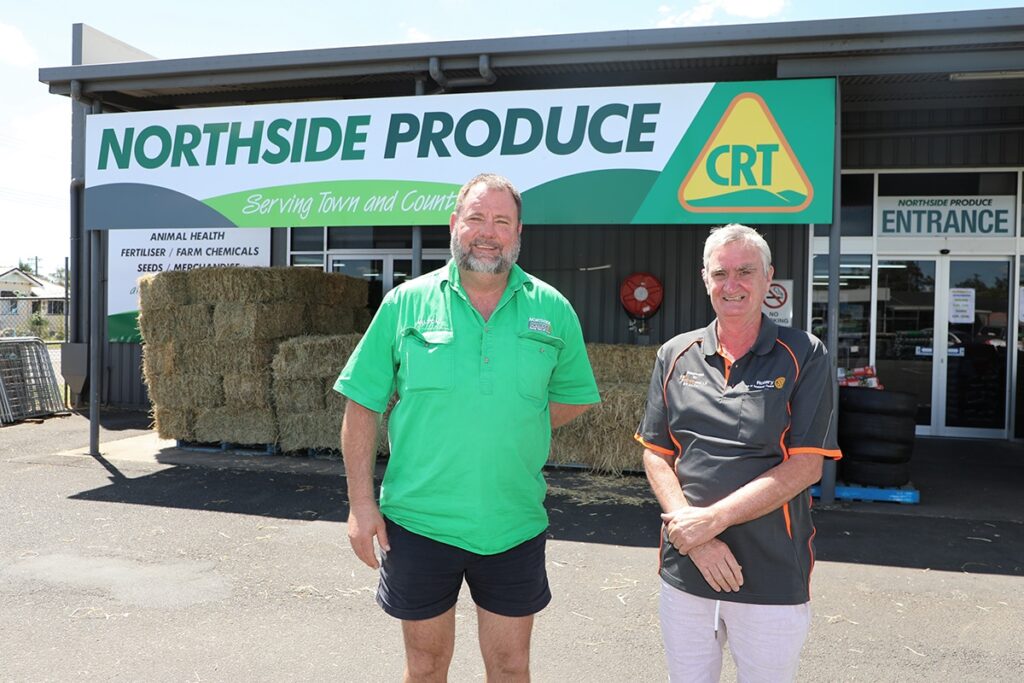
More than $620,000 in funding and animal food packs have been distributed to struggling farmers throughout the region to help support their welfare and emotional wellbeing.
Facilitated by Rotary Club of Bundaberg Central, The Bundaberg Drought Relief program has helped farmers adversely affected by drought, with an aim of improving sustainability prospects for impacted communities.
Past District Governor and Drought Coordinator Rod Medew said four parts to the program were rolled out over 18 months
“The program has delivered funds predominantly through third parties in the form of debit cards,” he said.
“This not only assists the farmers but also helps communities as the funds are spent in local stores.”
“The club was very aware that the program should also promote emotional well-being for those enduring the extended drought.”
Rod said The Drought Relief Program came about after its successfully implementation in Longreach.
“It was here that years of drought had an economic, social and health impact,” he said.
“Rotary clubs were donating money and food to farmers in the Longreach area and at the same time the drought was extending East to Bundaberg.
“The Rotary Club of Bundaberg Central decided to focus on the farmers in the Bundaberg Regional Council area.”
Rod said the first part of the program involved delivering food packs for animals affected by drought.
“This was achieved through a partnership with Northside Produce,” he said.
“Farmers were identified in need and supplied with $1000 worth of animal food packs.
“The packs represented a mixture of hay, protein pellets, lick blocks, dry licks, and various other hard feeds.
“Money for this program came from donations from Rotary clubs in Australia and overseas and funds were also obtained from the International Rotary Foundation.
“Approximately $120,000 of packs were delivered using these systems.”
Rod said the second part of the program involved the distribution of debit cards valued at $1,000 each.
“These cards could be used by farmers/graziers for purchase of any item (personal or farm items),” he said.
“The cards were obtained from the National Recovery and Resilience Agency who recognised that drought impacts our social, economic and environmental systems and that impact expands to businesses in small communities such as Bundaberg.
“Rotary engaged with NRRA to distribute the cards which was achieved through the Rotary club again partnering with Northside Produce.
“Field days were held where farmers came together to learn about modern farming techniques while Rotary distributed application forms.”
Rod said the third part of the program aimed at assisting farmers who were impacted by fire.
“This was regarded by Rotary as resulting from the extreme drought,” he said.
“Northside Produce identified farmers and the needs of farmers and Rotary supplied money for fencing, pumps and water tanks that had been destroyed as a result of the fires.
“The money came from Rotary Australia World Community Services and resulted in $80,000 being distributed to farmers in the Bundaberg area.”
Finally, Rod said the fourth part of the program aimed at providing $250 debit cards to be donated to farmers for their own personal use.
“Rotary placed a number of restrictions on these cards so they could only be used for personal use such as food, clothes, books and more,” he said.
“Rotary believes farmers have sacrificed time and money in order to sustain their farms and it was time to spend money on the family.
“These cards have been distributed by Rotary, Rural Financial Services and Northside Produce with the total amount in the Bundaberg area at $170,000.”
Rod’s special connection to farmers
Rod said he was particularly passionate about The Drought Relief Program due to his own experience in witnessing the struggles of farming communities throughout Australia.
“As a District Governor for Rotary, my wife and I travelled through Central Queensland during the worst of the drought and spoke to farmers,” he said.
“The same story was told whichever town we went to – no water, no food for animals and no income.
“Mental health was also an ongoing issue, and I became passionate about assisting the plight of farmers using Rotary as a vehicle to deliver services.”
Rod said since the program had kicked off there was a notable change in mindset within the local farming community, with benefits also impacting the region as a whole.
“The real achievement has been in the form of a change in morale, the spirit of thankfulness and gratitude, along with encouragement and hope,” he said.
“As mentioned, the money is now circulating in Bundaberg areas and also helping small business.”




